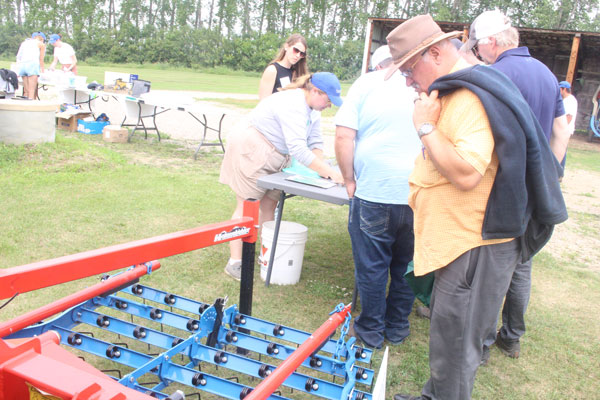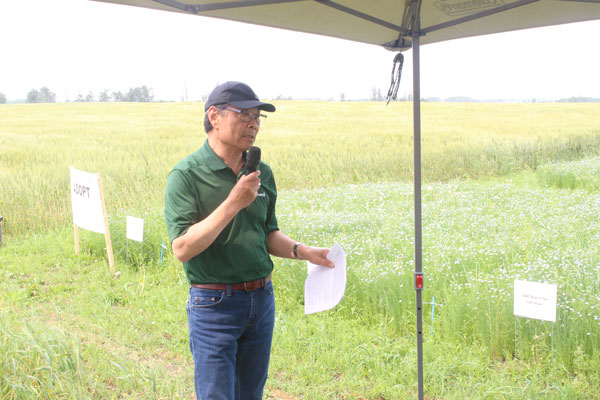
There was a new feature at the Conservation Learning Centre (CLC) PA Field Day on Tuesday, July 24 as the Centre partnered with SaskOrganics for the afternoon session.
Michelle Beckett who became executive director of SaskOrganics seven months ago explained that the organization is always looking for partners.
“So we were looking for people to partner with for doing some of the Field Days. It’s a lot of work putting one together and these guys do a great job. So that was one of the reasons,”
She explained that another reason was Government of Saskatchewan extension specialist Dunling Wang.
“He was appointed by the Government of Saskatchewan to be our government advisor on our board and he’s very supportive of these research initiatives and coming up to speak to these research trials as well,” Beckett explained.
Beckett said that because the CLC was doing organic trials SaskOrganics thought they would be a great partner
“(We could) communicate with the people who are coming out to find out about it and let organic producers know that there’s an organization that they can get involved in,” Beckett said.
One example of a trial at the CLC is an intercropping trial.
“Intercropping is coming up in regenerative and organic field management where you plant more than one crop.”
She explained that single crops cause some issues and having different crop species can fix nitrogen problems, bring phosphorous into the soil or make the nutrients more available to the plants there.
According to Beckett, the organic community in Saskatchewan is active with well-attended field days in Carrot River and Spalding and one planned in Swift Current this week.
“We’re trying to get everywhere because, in Saskatchewan, it’s a big province and everywhere has a different soil type. Yeah. So different things are happening in different locations because of different soil types,” she said.
Beckett said that as long as the CLC is running trials she can see SaskOrganics returning to field days.
“It went really well this year. They did a great job of organizing things.
With Wang on hand to do some presentations she said that conventional producers can learn about organic production.
“A big part of what SaskOrganics wants to do is educate conventional producers about the options for getting more into organics, reducing your input, doing different things with field management and maybe even one day transitioning over to organic production,” she said.
Producers have the option to both organic and conventional fields.
“It’s a little bit trickier to keep everything separate, but it can be done and that way you can take advantage of both targets,” Beckett said.
She explained that SaskOrganics also does education through webinars with speakers who can educate producers.
“I really want to expand getting in front of conventional producers and telling them about what it is that we do and how they can get involved. And yes, that you can have conventional and organic that the demand for organics is still pretty high and that If you want to sell into that market, it’s still fairly lucrative to do that.
She encouraged interested people to come to SaskOrganics events.

“It’s great if people come out to our events and everybody’s always welcome. It doesn’t matter who you are, if you’re any kind of producer, grain producer, whatever. Come on out to our events and talk to people and just learn something new about what it is that we do,” Beckett said.
She added that SaskOrganics fundraises for 100 per cent of their operational funding.
“So if you want us to keep putting on events, then you can let us know by donating,” she said.
The morning conventional session discussed various topics around pulse, wheat and barley.
The CLC is located south of Prince Albert, CLC is a producer-driven, non-profit corporation whose research is funded by farmers. It was established in 1993 under the Parkland Agricultural Research Initiative.

